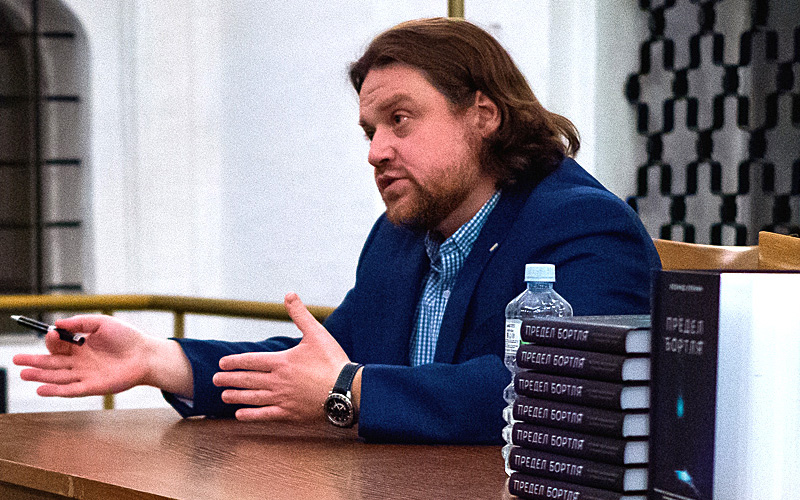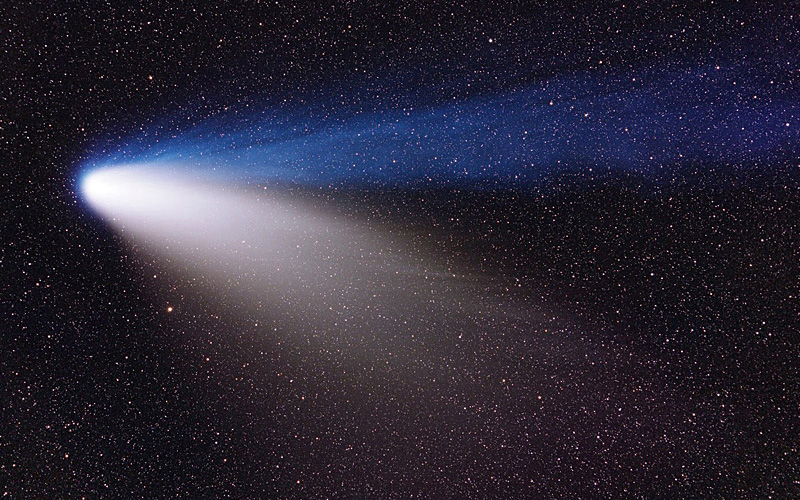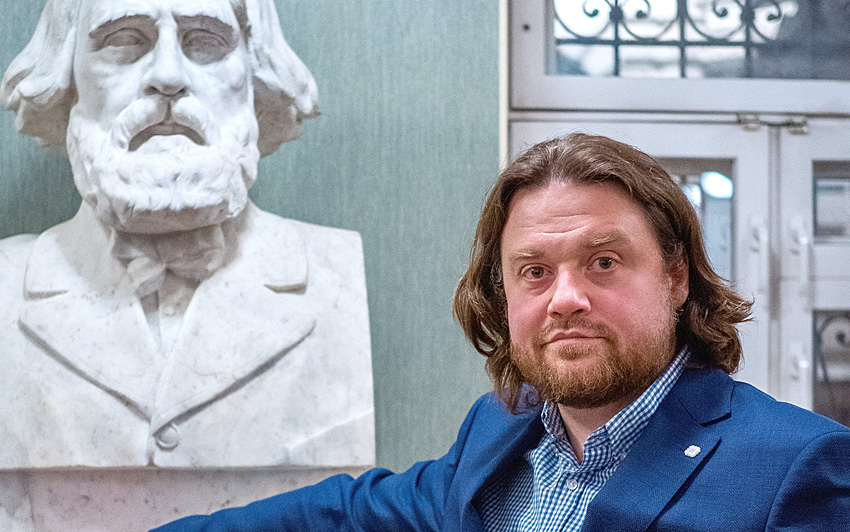What does a science fiction writer need a comet for? MAI graduate tells about astronomy, his writerly journey and science popularization

Leonid Elenin, a graduate of Moscow Aviation Institute, a researcher of Keldysh Institute of Applied Mathematics of the Russian Academy of Sciences, holds the record for the number of discovered asteroids and comets among CIS astronomers. At the moment, he has discovered more than 100 asteroids, four of them were numbered, and six comets. His science fiction book about the discovery of comets has recently been published.
At school Leonid Elenin dreamed of discovering a comet. The path to the dream took thirteen years. But even earlier he wanted to become a writer. The realization of this dream had to wait twice as long. In his first book, “Bortle scale”, both dreams came together.
The plot of the novel develops around a situation when an astronomer discovers a new comet and it turns out that it is heading towards Earth. What is going to happen on Earth in this case? Is humanity ready for this technically and, no less important, psychologically? How will a human being behave, has he really changed over thousands of years and who is his main enemy?
Despite the fact that comets have been feared of for a quite long time, the comet from Leonid Elenin's novel is neutral. Neither good nor evil. It just goes in its orbit, which it entered two and a half million years ago. And as the plot unfolds, it gradually turns out that we are our own main enemies, and not a comet at all.
Leonid Elenin told how the book was created, about the sources of scientific and literary inspiration and about his further plans in an interview.
Why did you choose such a specific notion as the “Bortle scale” for the title of the book? (Bortle scale is an estimate of the survival rate of a new comet visiting the inner Solar system for the first time when approaching the Sun).It seemed to me mysterious and unusual, somehow "cinematic" and at the same time closely intertwined with the novel itself. The title was invented immediately, on the same night as the script of the book itself. There were no alternatives! Interestingly, it was also immediately accepted by the publishing house, although, according to their own words, this is very rare and in most cases they suggest to change it to a more "saleable" one. I still consider it my lucky author's find.
I wanted to write a book for the widest possible readership. That was the main idea. Turning to popular science literature, I would certainly lose most of my readers. Those who are not interested in space yet and they simply do not go to these shelves in bookstores. Therefore, it was the first unshakable decision, as well as the fact that it would be science fiction, and not another "Hollywood" action movie. There are enough of them without my story already. There were various suggestions for editing the book, but I insisted on my own, and in the end the book came out the way I intended it to be.
How autobiographical is the plot? Did you give the heroes your own impressions, experiences, moments of life? And where did they get the material for the characters?
Of course, it is autobiographical. But only partially. The main character, like me, lights up with the desire to discover his comet, watching another comet being discovered. This is the path of many comet hunters. Bright comets generate new discoveries, so it was, and so, I hope, it will be.
The book is based on the experience that I have accumulated. Both social and scientific. That's why I couldn't write this book before. The time came when I couldn't help but write. All the main characters are, of course, fictional, but they all have my certain traits. All except one, whom I wrote in memory of a person close to me, and this is not the main character. One of my main fears was to create "cardboard", inanimate characters.
Back in elementary school, when I read Alexandre Dumas, I decided that I would become a writer, and even started writing a novel. However, I immediately realized that it was not that easy. As a result, this dream fell asleep, but did not disappear, and I still did it thirty years later.
The second dream – to discover my comet - appeared already in high school, in the spring of 1997, when the great Hale-Bopp comet "hung" over the Northern hemisphere of the Earth, and it could be seen even in the city, by the light of street lamps. What an unforgettable sight it was! Then I thought, "Billions of people are watching this comet right now but there was time when only a few people knew about its existence!". I discovered my first comet thirteen years later, and my first asteroid two years earlier.
 Hale-Bopp comet
Hale-Bopp comet
At a meeting with readers in the St. Petersburg Planetarium, you said that the book "Treasures of the Starry Sky" by the popularizer of science Felix Zigel became the impetus for finding yourself in science for you...
It happened quite by accident. It was summer vacation, and judging by the fact that I was at home and not in the yard, it was raining outside. I was bored, and I began to look at the bookshelf. The choice fell on "Treasures of the Starry Sky", although I was absolutely far from astronomy. But the book was written with such talent – simple, but at the same time profound - that I drowned in it. And this, of course, is the merit of the author.
I re-read this book many times, probably more than I re-read only my own book.
Communicating with fellow astronomers and amateurs, I often hear that this particular book became their first guiding star in the profession. I can recommend this book to everyone, even now. Yes, certain statements were added, rejected or changed, but as the first book on astronomy it is still invaluable. It is head and shoulders above many modern ones.
The actual writing of the text – from March 20, 2020 to February 20, 2021 – took place during the period of the pandemic. Is it by chance?
No, not by chance. The book was conceived in 2015-2016, but I could not come up with a concept that would suit me. The puzzle did not match for several years, ideas appeared and were rejected, it was impossible to connect the astronomical part of the book with the one that was supposed to make the book interesting for a wide range of readers.
I knew exactly how it should begin and end, and I had to describe all the events as realistically as possible, which means no Bruce Willis and other non-science fiction. And I also had to keep the intrigue until the very end!
As a result, the scenario embodied in the text came suddenly to me, when I went to bed. I just saw in my head a short film with a complete, albeit brief, script, from the beginning to the denouement. I got up, took a laptop and wrote down a page and a half of the text, which became the outline of the future book. And I had to sit down and write. I set some deadlines and missed them. I thought: I’ll start after the New Year, after the holidays, and so on. On Friday, March 20, 2020, we were announced that we went on distant mode, and I realized that this was exactly the sign that I was waiting for. And if not now, then I will never write this book. And I got to work. I opened an empty file, realized that there were hundreds of thousands of characters ahead to print and wrote the first sentence, which was included in the final version of the book without changes. I took a printscreen and started working.
The first comet c/2010 X1 that you actually discovered in 2010 and the comet from the book – how are they similar and how do they differ?
Of course, this comet was the main prototype. Both comets are dynamically new, meaning they visited the inner solar system for the first time. From the history of the first comet, I also took the tension of discovering the comet “at the last moment”, because my first discovery also almost failed: an American professional telescope did not reach the place where my comet was, only one field of view. It had to go a little "to the left", and it went "down". On that day, due to being busy at work, I processed the received frames very late and could not have time to discover the comet before my colleagues overseas.
The story of determining the orbit of the first comet also influenced the plot of the book. In fact, I put all my experience into it, which I wanted to share with the reader.
Both comets – the one that I discovered and the comet from the book – aroused the "attention" of the society, and this also had its impact. Hysteria about my first comet was well fueled in the West, but here in our country there were only echoes of these events. I extrapolated this experience on a larger scale, since my first comet absolutely did not pose any threat to our planet, unlike the comet from the book.
By the way, before I sat down to write a book, I realized that I needed a “real” comet. With a real orbit, and that its entire flight was simulated on a computer. And I came up with such a comet, and, like a sculptor, I created it the way I intended. It had to be found there and then, where and when I needed it. It moved across the sky in this way, and not the other. I took into account its visibility from the Earth and from spacecraft. These are all real calculations. Perhaps it was redundant, but it was more interesting for me to write this way.
I will be very glad if, having interested someone, I will direct them along the path of comprehending science, as Felix Zigel once did for me. Now, already working on the second, this time a popular science book, I asked myself the question: who is more numerous - people who discovered comets, or astronauts who have been in space? It turned out that there were less than five hundred of the former, and about six hundred of the latter.
Which of the popularizers, from your point of view, has succeeded in their work and what are their secrets?
The first one that comes to my mind is Carl Sagan. Although we also have excellent popularizers of science, for example, Stanislav Drobyshevsky, Alexey Paevsky and many, many others. It is always much more interesting to read a book written by a professional. When the author knows and understands what he writes about. And the reader feels it very well!
But still, many popularizers write precisely popular science literature, and I believe that these are scientists, who can make an invaluable contribution to the development of science fiction. Such a book, if well written, will be much deeper than the works of authors who know only superficially the subject they touch upon.
Yes, science fiction is going through hard times: not only in our country, but also worldwide. But I'm sure there is bright future for it!
 Leonid Yelenin at the bust of I.S. Turgenev
Leonid Yelenin at the bust of I.S. Turgenev
And what books of this genre do you consider the most significant?
I can't and probably don't want to put anything forward. My worldview, my writing experience and style was influenced by a whole ensemble of classical science fiction literature, both Russian and foreign. Probably, the fiction of Efremov, Bulychev, Clark, Sagan is closer to me. I do love the Star Wars universe though. Of the recent books, I liked Liu Cixin's trilogy "Memory of the Earth's Past."
It seems to me that even a fantasy novel should raise universal questions about human, his passions and choices. For example, in my book the question of knowledge and ignorance is acute. Which is better or maybe easier? I still don't have a clear answer.
And I would advise young people to read not only modern authors, but also turn to the classics of science fiction, since it is reprinted. Yes, there may not be mind-blowing battle scenes, but they are still relevant and deep. Read "The Village" by Kir Bulychev and "Planet of Storms" by Alexander Kazantsev.
What will your second book be about?
It will be a non-fiction book about my favorite comets. I want to tell a modern story about them, to put into it all the knowledge accumulated by mankind, but in an easy and interesting way. This is not a textbook or an encyclopedia, this is a story. There will be stories about comets known and unknown to a wide range of readers, stories about comet hunters from different eras, and stories about our contemporaries are written based on unique interviews that they agreed to give me. These are Gennady Borisov, Robert McNaught, Alex Gibbs, Terry Lovejoy. No one refused me an interview, even under current circumstances. The astronomical fraternity exists!
In the new book, I will tell you how to try to find a comet, and about my path to dream and discovery. And in the notes there are already ideas for a new science fiction.